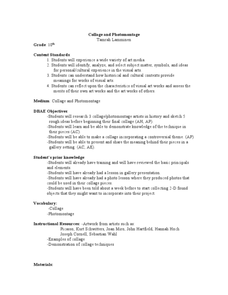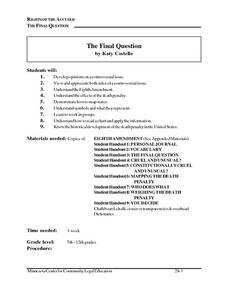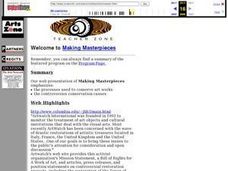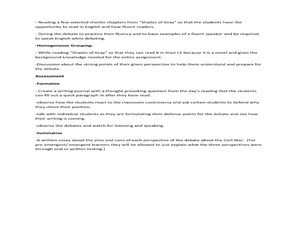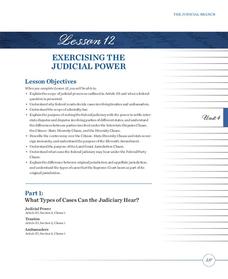State Bar of Texas
Dred Scott v. Sandford
Who decides someone is not a real person? Scholars investigate the Dred Scott v. Sandford court case which deals directly with slavery and citizenship. After viewing a short video clip, classmates work in pairs to assess and discuss the...
Curated OER
Collage and Photomontage
Tenth graders discuss collage and photomontage techniques and artists, and how the art form can convey cultural or current issues. They research a collage artist, then design a topical or personally symbolic collage. Present their...
Curated OER
Genetics
Comprehend that many human characteristics-all physical traits and possibly many personality traits-are determined by our genetic makeup. These activities demonstate that all physical traits are genetically determined, some evidence...
Curated OER
The Missouri Compromise of 1820
Students use a map of the Missouri Compromise to explain the geographical changes it brought to the U.S. and why the changes provoked a debate over the expansion of slavery in the U.S.
National Endowment for the Humanities
Kennewick Man: Science and Sacred Rights
"Have respect for the dead!" Scholars investigate how science and religion often clash. As they look into the laws of science and the laws of religion, the legal ramifications at the federal level of both play into an argument they...
Curated OER
Beginning Your Inquiry
If you're starting a research project, use this guide to help young learners form the inquiry for their research. With steps that outline the entire process, including note taking and gauging the quality of an inquiry question, this...
Curated OER
The Final Question
Students analyze their own feelings about the death penalty before considering court cases involving the death penalty. They determine what their definition is of cruel and unusual punishment, and analyze how different states handle the...
Curated OER
Welcome to Making Masterpieces
Students examine factors that affect conservation of art works after identifying the nine agents of deterioration. They study techniques and thought processes behind art conservation.
Curated OER
Valuing Different Views: Taking a Stand on Media Violence
Students recognize the value of multiple perspectives and differences of opinion. They build empathy and open-mindedness for other points of view. They study the complexity of social and cultural issues such as violence in media.
Curated OER
Civil War Perspectives
Fifth graders have a debate and defend one of the three different perspectives of the Civil War. In this Civil War lesson plan, 5th graders defend either the North, the South, or the Neutral perspectives.
Curated OER
A Look at the History of Book Banning in America
Why do books end up on the banned book list? How do these banned books contribute to the literary canon? Start by showing the photo slide show, and discussing notably banned books. Then focus on some of the most popular objections:...
Curated OER
Parrot in the Oven: Anticipation Guide
Get readers thinking about the major themes in Victor Martinez's award-winning novel, Parrot in the Oven: Mi Vida by asking them to agree or disagree with the prompts on an anticipation guide and to discuss their responses with class...
PBS
The History of Book Banning in America
Harry Potter, Are You There God? It's Me, Margaret, To Kill a Mockingbird. Kids view a slide show and then discuss the seven banned books featured in the presentation and the reasons why the books may have been banned.
Advocates for Human Rights
Deliberative Dialogue
How do you create a classroom environment where hot button topics may be discussed in a respectful manner? As part of a series of lessons that focus on immigration issues, class members examine the rules for civil discussion before...
Heritage Foundation
Exercising Judicial Power
We should all do more exercising, but should the judicial branch as well? High schoolers develop their understanding of what powers the judicial branch carries because of the US Constitution, as well as where their limits lie in the...
State Bar of Texas
McCullough v. Maryland
Can a state government tax the federal government? The Supreme Court case McCullough v. Maryland explores different governments in the United States. Scholars research the court's decision with a video and discussion. They formulate...
Curated OER
Inner Circle/Outer Circle Debate Strategy
Arranged in facing concentric circles, half the class discusses an issue. The other half of the class takes notes which are then used to fuel a class discussion and to prepare editorial opinions on the topic at hand. So much emphasis is...
Curated OER
Validating Votes
Explore the discrepancies in Florida's vote counting process in 2000 and 2002 with this New York Times reading lesson. Middle schoolers study the viewpoints presented in informational text, paying attention to how word choice can...
National Endowment for the Humanities
Lesson 4 James Madison: Internal Improvements Balancing Act—Federal/State and Executive/Legislative
Who has the power? The founding fathers asked the same question when the United States was formed. Learners explore issues that arose during Madison’s presidency that raised constitutional questions. Through discovery, discussion, and...
Curated OER
The Bill of Rights is for US Today
The first ten Amendments of the U.S. Constitution are vital for young people to understand. Provide the foundation of the laws that govern our country with this junior high school lesson. Groups use the newspaper to identify rights...
National Endowment for the Humanities
James Madison: Raising an Army—Balancing the States and the Federal Government
To war! To war! Every nation in the history of the world has had to deal with warfare on some level. Scholars go through a series of activities and discussions surrounding the development of the Constitution to help them better...
National Endowment for the Humanities
Lesson 2 James Madison: The Second National Bank—Powers Not Specified in the Constitution
How much power is too much power for the federal government? Scholars use primary documents and constitutional research in groups to analyze the creation of the Second National Bank under James Madison. This is the second lesson of a...
Curated OER
James Madison: From Father of the Constitution to President
Students investigate reasons why James Madison is called the "Father of the Constitution." They discuss three events during his presidency that raised constitutional questions and look at Madison's opinions of those questions. They...
Curated OER
Draft Dilemmas
Consider the possibility of a new U.S. draft with this lesson, which encourages class debate and persuasive arguments. Middle and high schoolers discuss how such a draft might be enacted and how they would feel about it. They write...
Other popular searches
- Controversial Medical Issues
- Controversial Statements
- Controversial Science
- Controversial Issues
- Controversial Art Exhibit
- Controversial Events
- Controversial Films
- Controversial Hero
- Controversial Topics
- Current Controversial Issues
- Controversial Science Issues
- Controversial Issues Paper



